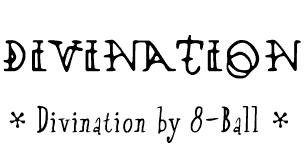People think I'm joking when I tell them that I divine using an 8-ball. There's something patently cheesy about this practice, they tell me, but I'm
listening to none of it.
They can use their tarot, their dice, their scrying mirrors and ouija boards
which one can interpret to mean anything - with an 8-ball, you get several
very simple answers: the basic 'Yes,' the basic 'No' and the basic, 'Ask
Later.'
The 8-ball has never lied to me. As long as you ask it a serious
question, I've found you'll get a serious answer. Of course, the 8-ball falls
prey to some of the same difficulties of other methods - opening your Ball to
whatever spirit may answer will end up netting you some false answers, but
with the proper precautions, this can be mostly screened out.
There are distinct advantages and disadvantages of using this method of
divination. The main problem is that specific questions cannot be asked,
only yes or no questions. Of course, if you are only asking yes or no
questions, this is the way to go, because unlike a pendulum or ouija board,
the Ball cannot be subtly influenced to the answer one wants to see by one's
subconscious. On top of this, there is rarely any confusion as to what the
Ball is saying.
One of the best things about using an 8-ball is that it gets
a lot less stares than the chicken carcass strewn across your back porch or
the crystal ball covered with candle wax sitting on your living room table.
I packed my 8-ball in rock salt to purify it, and then consecrated it. To use
it, I hold the 8-ball '8' side up, and concentrate on my yes-or-no question,
then tilt it upwards and see what the answer is (if you don't know how
to do this, you aren't an American).
This method of divination would also be excellent for beginners, mainly
because the component (ya know - the 8-ball) is so easy to come by and, as I
said before, its possession is socially acceptable.








